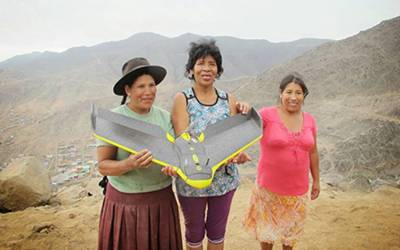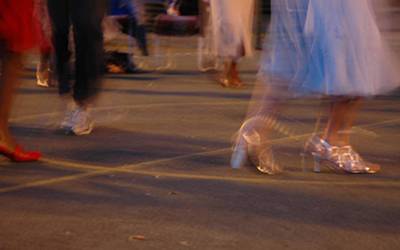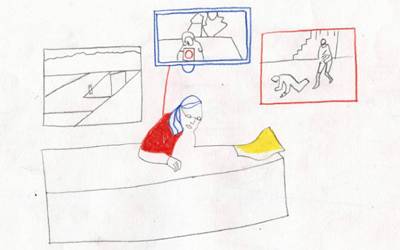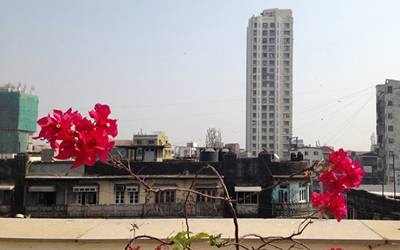The Bartlett Ethics Commission seeks to develop a practice of ethics for built environment researchers and practitioners, navigating connections between universal principles and particular processes.

The Bartlett Ethics Commission seeks to develop a practice of ethics for built environment researchers and practitioners, navigating the relationship between universal principles and particular processes. It is led by Professor Jane Rendell, Director of Architectural Research (2004-11) and Vice Dean Research for the Bartlett (2010-13), and Dr David Roberts, Bartlett Ethics Fellow, and brings together specialists from across The Bartlett, UCL and beyond, with collective expertise in action-based, humanities, participatory, practice-led, social science and science methods.
Alongside The Bartlett Ethics Commission, Jane and David have been co-members of the RIBA Ethics and Sustainable Development Commission Consultative Group, and Jane has been Co-Investigator for ‘The Ethics of Research Practice’, part of Knowledge in Action for Urban Equality (KNOW) project (PI Prof Caren Levy), working with Research Associate, Dr Yael Padan.
Together Jane, David and Yael have co-curated an open access educational toolkit, practisingethics.org, including over 30 contributors, which includes a lexicon of ethical principles, guidelines on how to negotiate ethical issues in practice, reading lists of ethics publications, overviews of ethics protocols, and case studies including reflections on the hotspots, touchstones, keystones, blindspots, moonshots and milestones of ethical processes. A summary of this work is available in The Bartlett Review.
The research has received three awards: A UCL Provost’s Award for Education in 2018; a Commendation in the category of Ethics and Sustainability in the RIBA President’s Awards for Research in 2018; and an RIBA Research Award for Education in 2022 under the title ‘Will I Cause Harm?’.
For specialist ethical advice, please follow links to guidelines and protocols. For more information on related projects, events, papers, publications and initiatives, please see the following sections on this page:
 Projects
Projects

The Bartlett Ethics Commission encompasses a number of research projects and working groups with the aim to identify specific issues arising in built environment research and develop a Bartlett vision and code to guide the practice of ethics in teaching, research and enterprise in the built environment.
- See all projects
Ethics in Built Environment Research (September 2014 – September 2015)
This research project took the first step in identifying specific issues arising in built environment research.
Download PDFBartlett Ethics Working Group (January 2015 – June 2017)
The core aim of the Working Group was to develop a Bartlett vision and processes to guide the practice of ethics in teaching, research and enterprise in the built environment. This approach to ethics was envisaged to be specific and appropriate to built environment disciplines and related professions, and its processes driven by pedagogic and intellectual concerns, rather than bureaucratic conditions.
Download PDFReport of the Bartlett Ethics Working Group Pilot (2016-7)
Through monthly meetings, work started on the UCL Ethics Pilot in September 2016, with the aim of mapping, modelling and testing the implications of the new UCL ethics processes and recommending a new devolved model which is locally-managed, administrated, and resourced.
Download PDFPractising Ethics (September 2015-September 2016)
A PhD training project funded by LAHP – led by Professor Jane Rendell, (The Bartlett School of Architecture, UCL) in collaboration with Professor Sharon Morris and Dr Hayley Newman, (The Slade School of Fine Art, UCL) and Professor Alan Read (Kings College London).
Download PDFReactivating the Social Condenser (May 2016)
A collaboration between Professor Jane Rendell and Dr Michal Murawski (Paul Mellon Fellow, SSEES) to re-examine and re-charge the social condenser as a vector for radical architectural thought and practice.
Visit webpage
Special issue of the Journal of ArchitectureSpeech ExtrActions – Testimony, Evidence and Witness in Response to the Mining Industry (June-October 2016)
A collaboration between Professor Jane Rendell and Diana Salazar (DPU, The Bartlett, UCL) to strengthen global partnerships between academics and activists working in mining, the environment and human rights.
Download PDFThe Bartlett Ethics Commission (September 2015 – September 2020)
A summary of the key activities and outputs of the Commission.
Download PDF
 Events
Events

From 2014 onwards, the Commission has been involved in the hosting of 12 events, from a two-day public international conference to in-house training sessions for postgraduate researchers. They have provided a platform for Bartlett students and staff and wider UCL community to speak alongside key built environment practitioners – academics, anthropologists, architects, artists, community activists, designers, engineers, planners, philosophers, public intellectuals, scientists, urbanists and writers – to collectively discuss practical and conceptual ethical issues and share innovative approaches.
- See all events
Rich Seams/Dark Pools (January 2014)
A conference exploring the full range of positions on the subject of fossil fuel funding and research, and to better understand the different aims, motivations and issues at stake. It addressed such topics as influence, impact and engagement; the possibilities offered by arm’s length funding; the need to engage with corporations; the ethics and governance of donations and sponsorship; and the relation between academia and activism/campaigning.
Ethics in Built Environment Research: Bartlett Research Exchange (October 2014)
A symposium asking what particular challenges we face as built environment professionals and researchers to practice ethically today. It addressed key themes of sustainability, quality, participation, the Global South, and the co-production of knowledge in urban regeneration schemes.
Ethics in Built Environment Research: PhD Symposium (March 2015)
A day of presentations and discussions of ethical issues – practical and conceptual – encountered by PhD students from across The Bartlett.
Divestment Debate: This house would divest from fossil fuels (24 March 2015)
A debate between UCL academics on whether the university should divest from fossil fuels and sell its £21million invested in the industry.
Reactivating the Social Condenser: Architecture against Privation (18 May 2015)
A conference to re-examine and re-charge the social condenser as a vector for radical architectural thought and practice.
Practising Ethics in Built Environment Research: International Two-Day Conference (June 2015)
A transdisciplinary symposium to explore the role ethics plays in built environment research – tackling topics such as big data, fossil fuel, housing and regeneration, and addressing issues like confidentiality, consent, risk and vulnerability.
Media coverage
- AJ: RIBA and ARB ethical codes attacked
- AJ: What are architects responsible for
- Blog: Some ethical challenges in the built environment
Conference recordings
Practising Ethics: Positionality, Spatiality and Subjectivity in Dialogue: Symposium (October 2015)
A symposium to consider how ethics is practiced from the perspective of positionality, spatiality and subjectivity in dialogue. Drawing on their own experiences as students, supervisors, practitioners and researchers, speakers explored questions around the spatial positions we take up when speaking and listening, how these are informed by the psychic structures of subject-object relations and the power dynamics around seeing/being seen, speaking/being heard, and variations according to practice and discipline.
Speech ExtrActions – Testimony, Evidence and Witness in Response to the Mining Industry: One Day Symposium (October 2016)
A voicing of displacements, dispossessions and environmental disasters that have occurred in responses to the activities of the extractive industries. The presentations and discussions were considered in terms of issues of evidence, witnessing, and testimony connected with human rights and environmental justice. Speakers came from communities in Colombia, Brazil and Indonesia, legal associations, NGOs, and universities.
Judgement Calls: One Day Symposium (13 June 2017)
A one-day PhD workshop focusing on ethical dilemmas in art and architectural research and practice.
Creative Resistance: Architecture, Art, Writing, a Life…: One Day Symposium (4 July 2017)
A workshop exploring and performing the role of critical and creative writing in research. It asked how can experimental approaches to writing in architecture and open up spaces for resistance, dissidence, liberation?
Book launch of Emma Cheatle, Part-Architecture: The Maison de Verre, Duchamp, Domesticity and Desire in 1930s Paris (4 July 2017)
A book launch featuring a presentation by Emma Cheatle (Newcastle University) followed by responses from Hélène Frichot (KTH, Stockholm) and Barbara Penner (Bartlett), and an open Q&A chaired by Jane Rendell.
Six Troubling Things Before Breakfast: the ethics of re-imagining the possible, a talk by Pia Ednie-Brown (RMIT), as part of the Bartlett Ethics Commission
A presentation and discussion to explore ways in which a creative re-imagining of the possible – in the midst of material, situated actualities – offers potent forms of ethics-in-action. The presentation was structured through six vignettes about how and why the methods of creative practice research offer a potent crucible for the cultivation of ethical know-how in ways far more potent than the processes of institutional ethics approval.
Bartlett Research Conversations: The Age of Wildfire (28 January 2020)
The wildfires currently burning across the planet are one of many indicators that we are now in a moment of crisis. Funded by The Bartlett Ethics Commission, hosted as part of The Bartlett School of Architecture, PhD Research Conversations, and chaired by Professor Jane Rendell, Professor Lesley Lokko and Professor Kathryn Yusoff explore how interdisciplinary research across cultures can create a new opportunity to re-think epistemological boundaries and categories at a time when the decolonisation of canon seems both inevitable and prescient. They consider how lives and life-forms – historic, contemporary and future – occupy different positions of cause and effect, agency and possibility.
 Reports
Reports

As Bartlett Ethics Fellow, David has produced three new reports: the first maps ethical issues associated with research conduct; the second sets out the Bartlett’s specialist research on ethics; and the third explores the codes of ethics used by over 60 UK and international built environment professional bodies.
- See all reports
Ethics in built environment research textual analysis survey by Dr David Roberts
A survey collating and annotating papers, policies, procedures, governance structures and related resources on research ethics, integrity, funding and sponsorship at the Bartlett, UCL, other universities, professional bodies and specialist literature.
Mapping ethics at the Bartlett report by Dr David Roberts
A report mapping and connecting ethical approaches, expertise and issues at undergraduate, postgraduate and staff levels across the schools and units that comprise the Bartlett. It is based on 28 semi-structured interviews with staff across the faculty, 17 of which were conducted by Charlotte Johnson in 2014/15 and 11 by David Roberts in 2015/16.
The report is structured in three sections. The first summarises key findings and offers recommendations. The second sets out the organisational principles, structures, procedures, research, teaching and expertise related to ethics at all levels within each school. The third collates the range of common ethical issues raised across the faculty thematically.
The report is linked to an online appendix of ethics resources from across the Bartlett – publications, lectures, reading lists and samples of ethics applications.
Built environment professional bodies codes review by Dr David Roberts
A review surveying the ethical dimensions of codes of conduct and practical guidance resources from 55 UK built environment professional bodies. Their commonalities and divergences are analysed against the ethical principles and support from a further 11 international and independent organisations. It brings together construction, design, energy, engineering, heritage, planning, project management, surveying, sustainability and transport bodies but its constructive critique is principally oriented to UK architecture professions. Interim findings and recommendations were shared with the RIBA in August 2017 and the full report shared with the RIBA and ARB in January 2018.
The report is structured in five sections. The first section sets out key findings and recommendations related to principles, guidance and access. The following three sections unpack each of these subjects in more detail, quoting from emerging professionals, independent organisations and specialist literature to give context to the way these issues are addressed by an array of UK and international professional bodies. The final section provides comprehensive links to the 66 codes and 51 guidance resources, brought together for the first time.
While each of these professional bodies has its own shortcomings and omissions, by reading across them we can establish an overview of the potential for professional bodies to set ethical standards and provide ethical guidance.
 Core publications
Core publications

The conceptual and practical context of the Commission’s research has derived from the work by Jane developing ethics as a form of critical spatial practice through her investigation into UCL’s decision to accept funding from the charitable arm of BHP Billiton and her pro bono work into the regeneration of the Aylesbury Estate in Southwark.
Alongside this, David’s research and practice addresses the unethical dispossession of social housing in London by exploring the regeneration of the Haggerston Estate in Hackney and privatisation of Balfron Tower in Poplar, and his survey of the ethical codes and guidance governing 66 built environment professions.
While Yael has been examining the western-centric bias of ethical values stemming from enlightenment thinking that privilege the individual over the collective. Common to this research is an investigation of how the relation between universal principles and specific processes is situated in specific contexts, and the proposition that it is through a practice of ethics that one navigates universal principles through specific processes.
A co-edited/authored book is currently in development.
- See all core publications
Jane Rendell, Expert Witness Statement for Aylesbury Leaseholders Public Inquiry in the use of Compulsory Purchase Orders on phase 1b/c of the ‘regeneration’ of the Aylesbury (January/April 2018)
Jane Rendell, Rebuttal Statement for Aylesbury Leaseholders Public Inquiry in the use of Compulsory Purchase Orders on phase 1b/c of the ‘regeneration’ of the Aylesbury (January/April 2018)
Jane Rendell, ‘From, In and With Anne Tallentire’, special issue of Field: Becoming A Feminist Architect (2017)
David Roberts, ‘Make Public: Performing Public Housing in Ernö Goldfinger’s Balfron Tower’, Journal of Architecture (2017).
Jane Rendell, ‘Arry’s Bar’, in Michal Murawski and Jane Rendell (eds) Reactivating the Social Condenser, special issue of the Journal of Architecture (2017)
Jane Rendell, ‘The Social Condenser: A Thing in Itself?’, in Michal Murawski and Jane Rendell (eds) Reactivating the Social Condenser, special issue of the Journal of Architecture (2017)
David Roberts, ‘Three Demands', RIBA Journal (2016)
Jane Rendell and David Roberts, ‘Ethical Encounters’, The Bartlett Review (2016)
David Roberts ‘A Building Archive’, in Beebeejaun Y. (ed) The Participatory City (2016)
Jane Rendell, ‘Giving An Account Of Oneself, Architecturally’, Special Issue of the Journal of Visual Culture (2016)
Media coverage
Interview with Alice Bell, as part of her ‘Five challenges for universities working with the fossil fuel industry’
Jane Rendell, ‘Critical Spatial Practice as Parrhesia’, special issue of MaHKUscript, Journal of Fine Art Research (2016)
Media coverage
David Roberts, Report in objection to Balfron Tower refurbishment proposal PA/15/02554 (2015)
 Further information
Further information

You can read more about UCL's policies on ethics and The Bartlett Faculty’s principles of creativity, integrity, equity and autonomy in the development of a sustainable, diverse world.
Please visit iDARE to see how research led by the University of Melbourne is investigating new ways of supporting ethical know-how and creative practice research for higher degree research candidates, supervisors, academics and ethics administrators.
The Bartlett faculty principles are:
- equity
- autonomy
- integrity
- sustainability
 Close
Close

